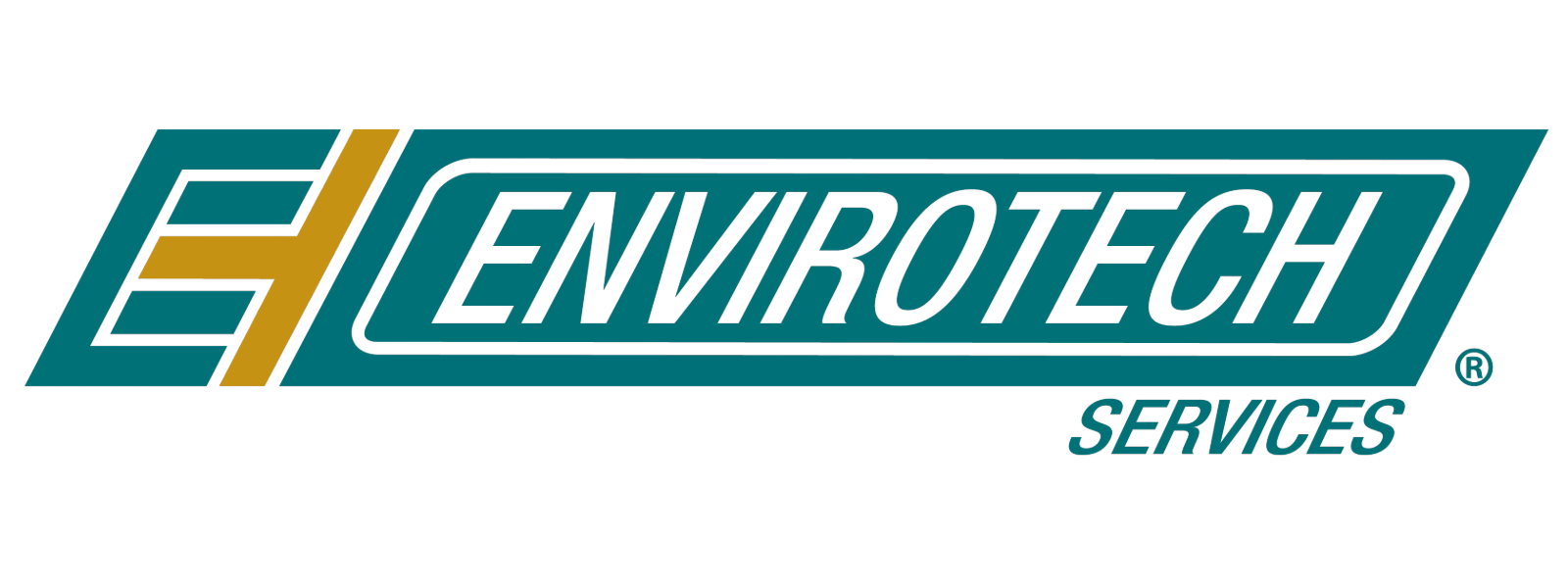Winter road management practices should carefully balance the safety of both the public and
the environment. When ice and snow are not removed from road surfaces, the results are
catastrophic, even deadly for drivers. On the flip side, over-applying caustic treatments to keep roads clear can harm the environment. Let's learn how to responsibly satisfy both these needs.
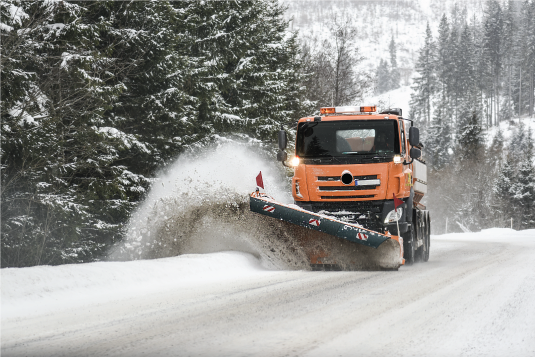
Public and Environmental Safety Are Not At Odds
Fortunately we do not have to prioritize one at the expense of the other. In fact, let's look at the ways both of these goals can actually complement each other and find common ground.
Common Ground
Reducing crashes protects the public and the environment
Vehicle crashes and pile ups certainly harm public safety, but they are also extremely damaging to the environment.
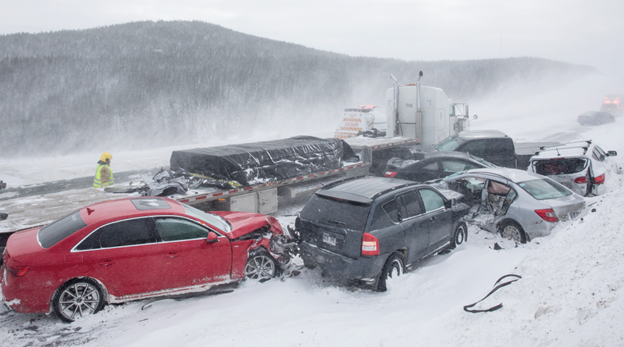
Crashes due to icy roads:
- Leak toxic fluids and chemicals
- Cause vehicle fires and wildfires
- Scatter sharp and dangerous debris
- Cause collisions with roadside vegetation and wildlife
Preserving our environment also improves public health and safety
Environmental pollution from winter road treatments can adversely affect public health in multiple ways:
- Sand and gravel used for traction releases harmful particulate matter (PM) into our air
- These same aggregates clog and damage public watershed channels
- Certain deicing ingredients can pollute waterways, cause toxic algae blooms, and kill off aquatic food sources
- Over applying road treatments, and using the wrong road treatments, can be harmful to animal life, soil, and vegetation
How To Balance Public and Environmental Safety
Choose Road Treatments That Protect All 4 Environmental Categories:
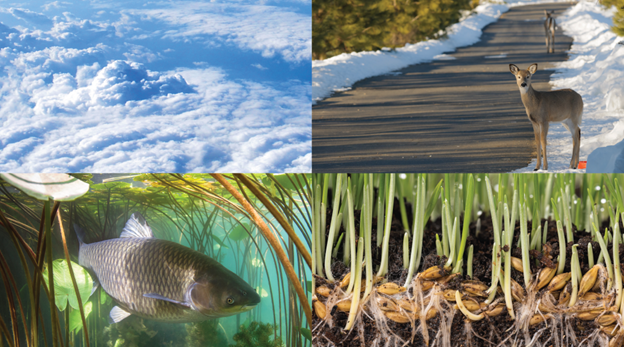
- Vegetation/Soil: treatments that reduce plant burn
- Air Quality: treatments that don't increase PM levels
- Water Health: soluble treatments that don't clog waterways or increase biochemical oxygen demand
- Wildlife: treatments that don't contain harmful toxins/dyes that bioaccumulate
Apply Road Treatments Responsibly
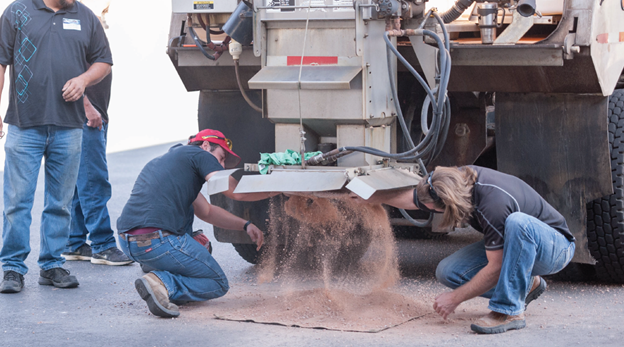
Here are some best practices to protect drivers without harming the environment:
- Train personnel on how to apply appropriate amounts of road treatments
- Pay close attention to weather alerts and local microclimates to stay ahead of heavy snow accumulation
- Apply light pretreatments to reduce ice bonding to paved surfaces
- Calibrate equipment to ensure consistent application rates
- Make purchases based on ..not cost (look at cost per lane mile or cost per storm to help you select products that perform better with less product)
Environment FAQs
Are environmentally safe deicers less powerful?
It is all about the ingredients. All deicers work by lowering the freezing point of water and some ingredients work more efficiently than others. Before making large deicer purchases, ask for sample sizes so you can try them out in real world conditions first.
Are gravel or sand environmentally safe deicer alternatives?
First, aggregates like gravel, sand, and cat litter (for home use) are not deicers. They do not lower the freezing point of snow and ice. Plus, they increase PM air pollution, clog drainage, pollute waterways, and are expensive to clean up each spring. Claims that sand and gravel are environmentally friendly alternatives are not considering public safety or all 4 categories of the environment.
Are agricultural byproducts (like beet juice and beet pulp) environmentally safe ice melt ingredients?
Deicers with agricultural byproducts can be safer for roadside vegetation, but much more harmful for waterway health. When these deicers runoff into local waterways, they provide a feast for water-born microorganisms. While they feast, they use up the dissolved oxygen in the water, killing off aquatic animals and allowing toxic algae to flourish. Remember, it is important to look at all 4 environmental categories.
Balanced Safety With Ice Slicer From EnviroTech
Harvested from a Jurassic mineral deposit in central Utah, Ice Slicer’s® natural high performance is preferred by snow fighters all across the snow belt states. With a unique blend of chloride salts and over 60 naturally occurring trace minerals, Ice Slicer® out-performs white salt with less product while protecting all 4 categories of the environment.
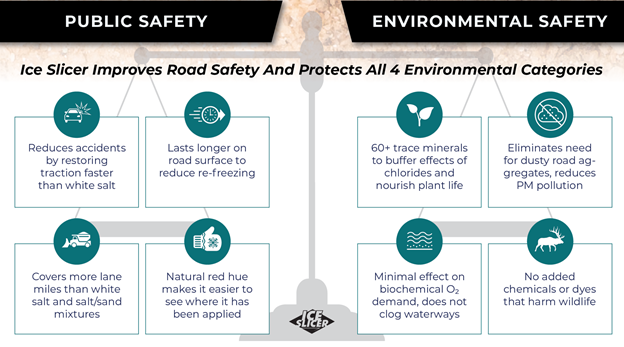
Public Safety
Ice Slicer® has many natural benefits that help improve road safety:
- Reduces accidents by restoring road traction faster than white salt
- Lasts longer to reduce re-freezing
- Covers more lane miles than white salt and salt/sand mixes (that means snow fighters can go longer before coming back to base to reload)
- Natural reddish color makes it easier to see where it has been applied
Environmental Safety
- Vegetation/soil: Naturally contains 60+ trace minerals to buffer the effects of chlorides on the environment and deposit plant enriching nutrients back into the soil
- Air Quality: Eliminates the need for dusty aggregates and helps reduce PM pollution in vulnerable areas
- Waterway Health: Does not clog waterways, chlorides have the lowest impact on biochemical oxygen demand of all deicing ingredients
- Wildlife: Contains no added chemicals or dyes
EnviroTech is proud to offer products with high performance and environmentally friendly credentials like Ice Slicer®. Give us a call today to try it for yourself!
